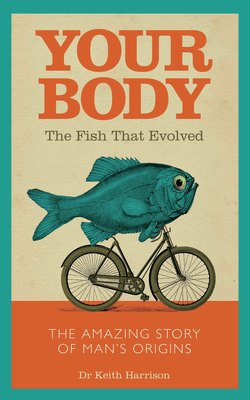Читать книгу Your Body - The Fish That Evolved - Dr. Keith Harrison - Страница 10
На сайте Литреса книга снята с продажи.
Mutations
ОглавлениеIn science fiction stories, mutants are invariably bad things. In the real world, ‘mutation’ just means ‘change’. Genes are copied during growth and as they pass from generation to generation, and whenever anything is copied accidental changes can creep in. An analogy can be made with an old story about the First World War. In this tall tale, the officers in the front line send a message back to headquarters saying: ‘Send reinforcements, we are going to advance.’ The message is not written down but is passed by word of mouth from one trench to the next until it reaches its destination. Unfortunately, by the time it arrives it has mutated into: ‘Send three and four pence, we are going to a dance.’ What is noticeable about this is that the message did not deteriorate into complete gibberish. It remains a perfectly logical message: ‘Send three shillings and four pence’, but now it has no relevance to the situation at hand and no relation to the original message sent. The problem arose because the message, like genes, was repeatedly copied.
Mutation of a gene may stop it working (in an egg, sperm or embryo, if the gene is important enough, this may kill the embryo) or it may not have a serious effect, or it may even make the gene more effective. As the change is a random accident, the results can be very variable. Like the message in the trenches, the gene may not be destroyed or garbled completely but it may cease to do the original job. Whether it survives in the population in its changed form will depend on whether this new form is harmful to its owner. A mutated gene that kills its owner while he or she is still in the womb will die with them. It will never be inherited by anyone else and will disappear from the world immediately. On the other hand, some mutations may be beneficial and will spread quickly in the population.
Here is an another analogy. Genes are instructions. They are like a cake recipe where the body is the cake. Imagine a rather uninspiring cake recipe that includes the instruction to add 100 grams of coconut. Not everyone likes coconut. Some people make this cake and some eat it but very few ask for a copy of the recipe. One day when someone does ask and is transcribing it into their notebook, they have difficulty reading the original handwriting. Instead of ‘coconut’, they think it says ‘chocolate’. They make the cake and instead of coconut add 100 grams of chocolate. The cake is delicious. Everyone who tastes it asks for the recipe. Suddenly instead of there being five copies of the recipe in the world, there are 500, then 5,000 and soon there are 5 million. The copying error, the mutation, has been very successful for this recipe and the cakes are now everywhere. This can happen to genes too. This can even happen to genes without the change being obviously beneficial. A mutation has occurred in blood which does not appear to have any benefit at all, yet like the cake recipe it has been very successful; for most of us it determines which blood group we are.
